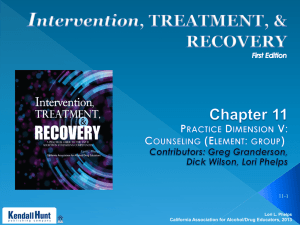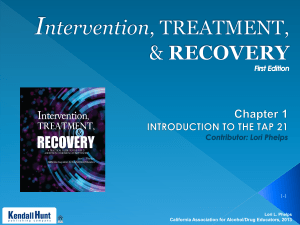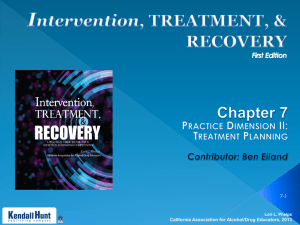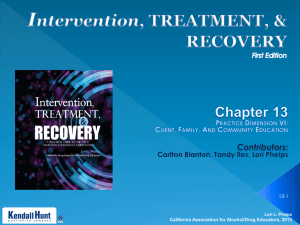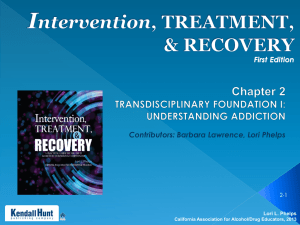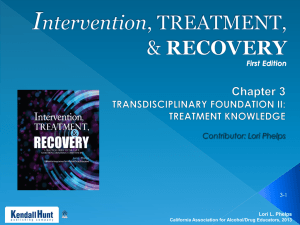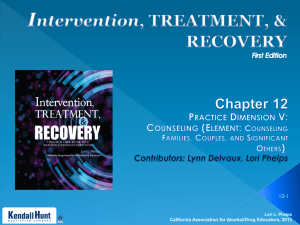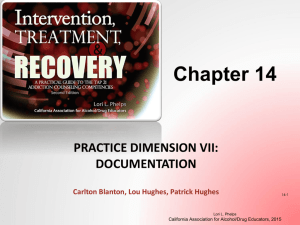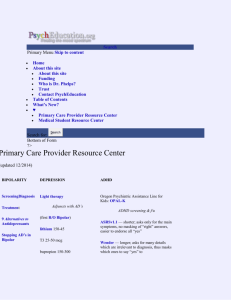Chapter 10 ppt - California Association for Alcohol/Drug Educators
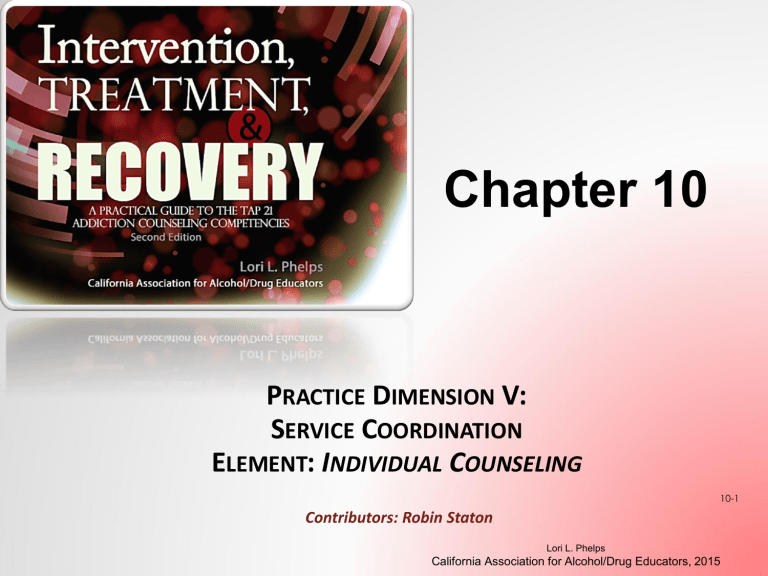
Chapter 10
P RACTICE D IMENSION V:
S ERVICE C OORDINATION
E LEMENT : I NDIVIDUAL C OUNSELING
Contributors: Robin Staton
Lori L. Phelps
California Association for Alcohol/Drug Educators, 2015
10-1
Counseling
A collaborative process that facilitates the client’s progress towards mutually determined treatment goals and objectives
© Olivier Le Moal/Shutterstock.com
Lori L. Phelps
California Association for Alcohol/Drug Educators, 2015
10-9
Counseling Methods
Counseling Competence
Methods sensitive to individual client characteristics and to influence of significant others, client’s cultural and social content.
©Eric Isselee/Shutterstock.com
Competence is built on an understanding, appreciation of, and ability to apply modalities of care for individuals, groups, families, couples, and significant others.
10-10
Element: Individual Counseling
Competencies 75 - 87
75
: Establish a helping relationship with the client characterized by warmth respect, genuiness, concreteness, and empathy.
76:
Facilitate the client’s engagement in the treatment and recovery process.
Lori L. Phelps
California Association for Alcohol/Drug Educators, 2015
10-4
Traits of a Successful Counselor
The ability to be empathetic with the client, yet maintain healthy boundaries.
Information, skills and knowledge delivered with compassion.
©Ksenia Raykova/Shutterstock.com
Lori L. Phelps
California Association for Alcohol/Drug Educators, 2015
10-5
Carl Rogers (1902-1987) Humanist
“If one is able to get to the core of an individual, then one finds a trustworthy, positive center.
People are trustworthy, resourceful, and capable of self understanding and self-direction.”
Lori L. Phelps
California Association for Alcohol/Drug Educators, 2015
©Tory Kallman/Shutterstock.com 10-6
Basic Therapy Tools
Congruence
Genuiness or realness
Unconditional Positive Regard
Acceptance and Caring
Accurate Empathetic Understanding
An ability to deeply understand the subjective world of the client
Lori L. Phelps
California Association for Alcohol/Drug Educators, 2015
10-7
Basic Therapy Tools
The skills developed through:
appropriate language and paralanguage
the practice of active listening
advanced active listening
Advanced active listening
Intuiting how a client really feels and confirming that with the client
Lori L. Phelps
California Association for Alcohol/Drug Educators, 2015
10-8
Competence in Counseling
The counselor must not let judgment or morals get in the way of being empathetic toward the client.
©Sergey Uryadnikov/Shutterstock.com
Lori L. Phelps
California Association for Alcohol/Drug Educators, 2015
10-9
Body Language
Understanding the body language of the counselor as well as the client is as fundamental as understanding the spoken word.
©MoMo Pics/Shutterstock.com
Lori L. Phelps
California Association for Alcohol/Drug Educators, 2015
10-10
Body Language
Listening with your eyes is as important as listening with your ears.
©Khoroshunova Olga/Shutterstock.com
Up to 50% of information conveyed is communicated through the body.
10-11
Body Language
• Proximity
• two and four feet away from the client
• similar chairs with no barriers
• lean forward
• open posture
• legs uncrossed
• arms uncrossed
• hands open
©Cartoonresource/Shutterstock.com
Lori L. Phelps
California Association for Alcohol/Drug Educators, 2015
10-12
Competencies
77 : Work with the client to establish realistic achievable goals consistent with achieving and maintaining recovery.
78 : Promote client knowledge, skills, and attitudes that contribute to a positive change in substance use behaviors.
79 : Encourage and reinforce client actions determined to be beneficial in progressing towards treatment goals
Lori L. Phelps
California Association for Alcohol/Drug Educators, 2015
10-13
Theoretical Foundations
Examples of counseling therapies and evidence based approaches in substance abuse :
Motivational Interviewing (MI)
Cognitive Behavioral Therapy (CBT)
12-Step Facilitation Therapy
See SAMHSA’s National Registry of Evidence-Based Programs: http://nrepp.samhsa.gov/
Lori L. Phelps
California Association for Alcohol/Drug Educators, 2015
10-14
Competencies
80 : Work appropriately with the client to recognize and discourage all behaviors inconsistent with progress towards treatment goals.
81 : Recognize how, when, and why to involve the client’s significant others in enhancing or supporting the treatment plan.
Lori L. Phelps
California Association for Alcohol/Drug Educators, 2015
10-15
Motivation for Change
Client Readiness
Self motivation can be assessed by hearing, observing and understanding client’s emotional and physical pain.
Self-motivation may happen when client recognizes the need for help with sobriety, or the family has reached a breaking point and requests help for the addict.
Sometimes achieved through intervention conducted by a skilled counselor.
Lori L. Phelps
California Association for Alcohol/Drug Educators, 2015
10-16
Intervention
“presenting reality in a caring receivable way”
(Vernon E. Johnson, 1990)
©nattanan726/Shutterstock.com
Lori L. Phelps
California Association for Alcohol/Drug Educators, 2015
10-17
Involve the Family in Treatment
The involvement of family members or significant others at appropriate times must always be a part of the treatment program.
©Eric Isselee/Shutterstock.com
Lori L. Phelps
California Association for Alcohol/Drug Educators, 2015
10-18
Family Involvement
Family recovery is as important as the client’s
Make referrals to
Family therapists
Al-Anon
Other support groups that provide positive support social support for the addicted families.
Lori L. Phelps
California Association for Alcohol/Drug Educators, 2015
10-19
Competencies
82 : Promote client knowledge, skills, and attitudes consistent with the maintenance of health and prevention of HIV/AIDS, tuberculosis, sexually transmitted diseases, hepatitis C, and other infectious diseases.
83
: Facilitate the development of basic and life skills associated with recovery.
Lori L. Phelps
California Association for Alcohol/Drug Educators, 2015
10-20
Skills Enhancement
• Assess basic skill deficits, educational and career needs early in the treatment.
• Recognize and address ambivalence
• Educate the client about life skills
• Make an inventory of those needs and create a plan to learn and practice new life skills.
Lori L. Phelps
California Association for Alcohol/Drug Educators, 2015
10-21
Past, Present & Future
Knowledge of the client’s history, both positive and negative, is helpful for:
developing the treatment plan
evaluating progress
making appropriate changes
.
Recognize co-occurring disorders
Make referrals
medical
educational
psychological
Lori L. Phelps
California Association for Alcohol/Drug Educators, 2015
10-22
Sexually Transmitted Diseases
Educate the client about health maintenance and prevention of
HIV/AIDS
Tuberculosis
sexually transmitted diseases (STDs)
hepatitis C, and other infectious diseases.
Refer to doctors and other health care workers trained in addiction
Lori L. Phelps
California Association for Alcohol/Drug Educators, 2015
10-23
Healthy Schedules
A consistent healthy schedule maintained at an inpatient or recovery home routine includes:
Early wake-up
Fixed meal times
Clean-up
Meditation
Group time
Fixed bedtimes
Lori L. Phelps
California Association for Alcohol/Drug Educators, 2015
©D.R.3D/Shutterstock.com
10-24
Healthy Practices
LIFE SKILLS :
Personal hygiene
Communication skills
Budgeting
Assertiveness training
Self-esteem
Interviewing skills
Anger management
©BsWei/Shutterstock.com
Lori L. Phelps
California Association for Alcohol/Drug Educators, 2015
10-25
Healthy Thinking
› Recognize drinking and using patterns, triggers, and relapse signs
› Recognize the people, places, and things that contribute to substance abuse
› Recognize the people, places, and things that contribute to a healthy lifestyle. ©Ai825/Shutterstock.com
Lori L. Phelps
California Association for Alcohol/Drug Educators, 2015
10-26
Competencies
84 : Adapt counseling strategies to the individual characteristics of the client, including but not limited to disability, gender, sexual orientation, development level, culture, ethnicity, age and health status.
©Vlad61/Shutterstock.com
10-27
Cultural Awareness
Be educated and aware of issues related to:
Gender
Sexual orientation
Development level
Ethnicity
Age
Health status.
©Ermolaev Alexander/Shutterstock.com
Lori L. Phelps
California Association for Alcohol/Drug Educators, 2015
10-28
Competencies
85 : Make constructive therapeutic responses when the client’s behavior is inconsistent with stated recovery goals.
©Javier Brosch/Shutterstock.com
Lori L. Phelps
California Association for Alcohol/Drug Educators, 2015
10-29
Recognize and Redirect Inappropriate
Behavior
The client may regress to old, familiar dysfunctional behaviors which may be inconsistent with the recovery goals.
Know the client’s strengths and weaknesses
Recognize stressors and crisis situations
Teach the client to identify and talk about his or her feelings
©jeep2499/Shutterstock.com
Lori L. Phelps
California Association for Alcohol/Drug Educators, 2015
10-30
Competencies
86
:
Apply crisis prevention and management skills.
©Eric Isselee/Shutterstock.com
Lori L. Phelps
California Association for Alcohol/Drug Educators, 2015
31
Crisis Prevention
Informed consent
Suicide contracts
Code of Federal Regulation (CFR) Title 42
Part 2
Health Insurance Portability and
Accountability (HIPAA) laws
Lori L. Phelps
California Association for Alcohol/Drug Educators, 2015
10-32
Competencies
87
: Facilitate the client’s identification, selection, and practice of strategies that help sustain the knowledge, skills and attitudes needed for maintaining treatment progress and preventing relapse.
©Elena Larina/Shutterstock.com
Lori L. Phelps
California Association for Alcohol/Drug Educators, 2015
10-33
Relapse
Common!
Does not have to be permanent
Relapse can be both emotional and physical
Recognize the signs
Practice relapse prevention strategies.
©Javier Brosch/Shutterstock.com
Lori L. Phelps
California Association for Alcohol/Drug Educators, 2015
10-34
• Alcoholics Anonymous: http://www.AA.org
• CNS Productions (Uppers Downers All Arounders): http://www.cnsproductions.com
• FMS Productions (treatment films): http://www.fmsproductions.com
• Hazelden (books, films for recovery): http://www.hazelden.org
• Motivational Interviewing: http://www.motivationalinterviewing.org/
Lori L. Phelps
California Association for Alcohol/Drug Educators, 2015
10-35
Videos/Webcasts
Johann Hari: Everything you think you know about addiction is wrong
TEDx on Youtube: https://youtu.be/PY9DcIMGxMs
Bill W: http://www.page124.com/
The only documentary about the co-founder of Alcoholics
Anonymous
Lori L. Phelps
California Association for Alcohol/Drug Educators, 2015
10-36
Videos/Webcasts
Essential Substance Abuse Skills 2013: Basic Counseling Skills https://youtu.be/4jpqQ8GJhW8
Lori L. Phelps
California Association for Alcohol/Drug Educators, 2015
37

